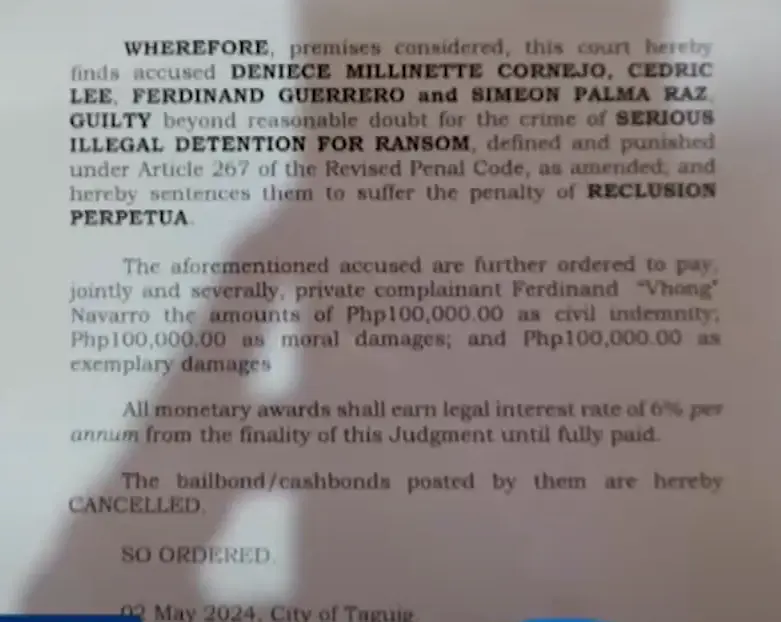The Taguig Regional Trial Court convicted businessman Cedric Lee, model Deniece Cornejo, and two other defendants to 40 years in prison in relation to a criminal lawsuit that actor-host Vhong Navarro brought in 2014. The court found them guilty of serious illegal detention, a non-bailable offense, for which they are liable for reclusion perpetua. The court ordered them to pay P300,000 in civil indemnity, moral damages, and exemplary damages jointly and severally.
Case Background
Businessman Cedric Lee and his crew, which included Simeon Palma Raz, Ferdinand Guerrero, and model Deniece Cornejo, were charged with serious illegal detention by Vhong Navarro in 2014. According to Navarro, he was beaten and imprisoned in Cornejo’s Taguig City condominium on January 22, 2014, on suspicion of abusing Cornejo.
Navarro said that Lee and his friends had physically assaulted him while he was being held captive and had threatened to harm him if he did not give them P2 million in exchange for his release. Navarro agreed to pay half the amount for his release, after which Lee claimed that the detention was a form of “citizen’s arrest” due to the alleged abuse on Cornejo.
Legal Proceedings
The trial culminated in a 94-page decision by the Taguig Regional Trial Court, which found Lee, Cornejo, Guerrero, and Raz guilty beyond reasonable doubt of serious illegal detention for ransom under Article 267 of the Revised Penal Code. The court imposed a 40-year maximum term on them, or reclusion perpetua. In addition, the judge revoked their bail bond and issued arrest warrants for Guerrero and Lee.

What is Reclusion Perpetua?
Reclusion perpetua, in simpler terms, means a maximum prison sentence of 40 years in the Philippines. Serious offenses such as serious illegal detention—involved in Vhong Navarro’s case—are charged with this punishment. It implies that the guilty parties would be taken away from their freedom and held in prison for an extended period of time.
Although the maximum punishment for reclusion perpetua is 40 years, it is considered a life sentence in the Philippines. As a result, individuals found guilty of reclusion perpetua may spend up to 40 years in prison before being eligible for parole or other forms of release.
Can They Appeal the Decision?
Yes, the guilty parties have the right to challenge the court’s decision. They can still file an appeal and request that the case be taken up by a higher court, even if they receive a 40-year prison sentence.
Further Developments
Cornejo and Raz were immediately taken into custody by the court, while Lee and Guerrero await arrest pending apprehension. In addition, guilty parties will have to pay Navarro:
- P100,000 – exemplary damages
- P100,000 – moral damages (for the emotional pain or suffering caused by the wrongdoing)
- P100,000 – civil indemnity (to cover the losses/harm caused by the wrongdoing)
The lawyer for Navarro, Alma Mallonga, attested that the court ordered Deniece Cornejo and Simeon Palma Raz to be taken into custody immediately following the announcement of the court’s decision.
- 2022 – The Court of Appeals rejected Lee’s request to dismiss Navarro’s case.
- 2023 – The abuse and acts of lasciviousness accusations brought against Navarro by Cornejo were also dropped by the Supreme Court for lack of probable cause.
Navarro, who was not present at the hearing, conveyed his delight with the court’s ruling via his legal team. One of Navarro’s attorneys, Bon Arcilla, said that the actor was “very happy” with the result and thought justice had been done.
